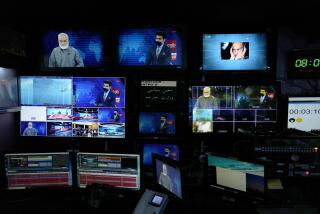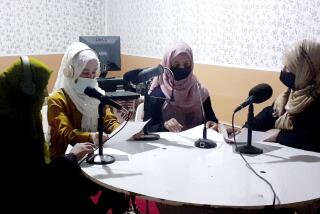Lights, Cameras, Laughter From Kabul
- Share via
KABUL, Afghanistan — Cue music. (Man with accordion assaults the ears.)
Lights! (They flicker a bit, but the studio brightens.)
Cameras! (The picture seems slightly unfocused, but it will do.)
And ... finally: Live, from Afghanistan! It’s Saturday night! (So what if it’s only live in a sort-of kind-of way.)
More than 700 people applaud wildly. Those who can whistle do. For after more than six years in the dark, Afghanistan’s longest-running, even if limping, variety and quiz show is back on the airwaves, drawing standing-room-only crowds to the theater where it is taped and attracting people to the country’s few remaining televisions like moths to lightbulbs.
In a country with so much misery behind it and mountains of problems ahead, the show, “Zehni Azmoyena” (in Pashtu), “Azmonga Zehni” (in Dari) or “Test Your Brain,” has reclaimed its slot as the program that people just have to talk about the next day. To find a television at 9 o’clock on a Saturday night in Afghanistan is to find a laughing crowd.
The show is part David Letterman, part Academic Challenge, part Monty Python, and the show of shows as far as people in Afghanistan are concerned. It began in 1979, survived the Soviet invasion and the subsequent civil war before going off the air in 1996, when the Taliban took control. It returned to the airwaves last winter, and the audience, as best as anyone can tell, keeps growing.
“People like us because they can laugh and learn at the same time,” says the show’s director, Muhammad Usman Azimi. “We are very proud of what we do here, even if we have some problems.”
The lights give out now and again, the microphones are the size of garbage can lids and about as high-tech, the cameras hardly provide a lifelike image, and 20-year-old editing machines make the presentation anything but seamless. (The show, taped live, goes on for four hours before being edited down to 70 minutes.)
Nobody knows how many people watch the show, by far the most popular of 18 being produced by the government-run television station.
But in Kabul, at least, which most nights has electricity, the people love testing their brains with a laugh; and if they don’t own a television, they will pile into a neighbor’s house or even stand in front of a tube pulled onto the sidewalk. “Zehni” is broadcast with frequent shots of audience reaction, and it is difficult to spot a person who can contain his laughter any better than the people howling on the streets.
On Saturday night, two contestants played a game often featured on the show. They were asked simple yes-or-no questions by the hostess--”Is your name Omar? Do you live in Kabul?”--and they were to say one answer while providing its opposite visually. That is, they were to answer “yes” while shaking their head side-to-side to indicate “no.” Or they were to answer “no” while nodding their head in the affirmative. By the third question, the heads turn in a circular motion.
Milton Berle never made America laugh so hard.
(As a sign of the show’s popularity, the bit about shaking the head “no” while saying “yes” has been a running joke, continuing during the years the Taliban pulled the plug on the program.)
“People come up to me on the street and ask me about the show and thank me for bringing laughter,” says the hostess, Rida Azimy. “I see it makes them happy, and that makes me happy.”
“Zehni” goes beyond laughs, however, to offer light-hearted social commentary and serious education wrapped in comedy. On a recent show, the announcer apologized for starting late but explained that he had been stuck in Kabul’s traffic.
“It was a message to the government that this traffic is crazy,” the director says. “They watch too.”
Between questions and puzzles, comedy skits are performed by an ensemble that slips in a helpful message here and there.
In one skit, a man performs a traditional Pashtun dance because he is, finally, about to be married. But in a message to noisy neighbors everywhere, he’s quickly reminded that he should not dance on the third floor of an apartment building because it will disturb those below.
Still, the quizzes are the heart of the show. “In what month did Al Qaeda destroy the Buddha?” goes one question.
“If a man flies to Japan and it takes 90 minutes to get there, why does it take 1 1/2 hours to return?” goes another.
In one segment, in English to encourage education, two teams are told: “A man walks out into the rain for a half-hour with no hat and no umbrella. He doesn’t get a single hair on his head wet. How can this be?” Answer: The man is bald.
Before the Taliban, enough businesses supported the program that contestants could win TV sets, motorcycles and refrigerators.
Now, as Afghanistan struggles, the prizes are more modest. A woman won chewing gum on a recent program. A man won some Pepsi.
“Maybe the prizes will get better again,” Azimi says, “but I don’t think they care. The prizes are not the point.”
Still, the tradition of the show includes awarding a grand prize at its conclusion. A child is called to the stage to pick among hundreds of numbers. Every audience member has one, which corresponds to his seat.
“D-12!” the announcer shouts from a pulled raffle ticket. A young man, maybe 17, bounces onto stage looking like he has just won all the stars in the sky.
Today’s grand prize: three cartons of milk and a box of blank CDs.
That, in Afghanistan, is show biz.
More to Read
The complete guide to home viewing
Get Screen Gab for everything about the TV shows and streaming movies everyone’s talking about.
You may occasionally receive promotional content from the Los Angeles Times.






